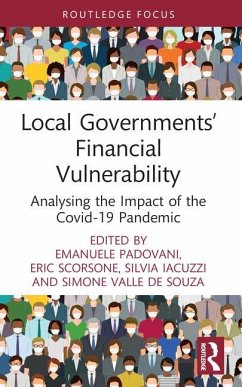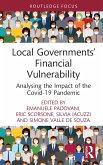Local Governments' Financial Vulnerability presents a conceptual framework developed to examine how vulnerable local finances were before and in the immediate aftermath of the COVID-19 pandemic crisis by mapping and systematising its dimensions and sources.
The model is then applied to eight countries with different administrative models and traditions: Australia, Austria, Bosnia and Herzegovina, Germany, Italy, Portugal, Spain, and the United States. Comparative results reveal not only that COVID-19 impacts and policy tools had a lot of similarities across countries, but also that financial vulnerability has an inherently contingent nature in time and space and can lead to paradoxical outcomes. The book shows that the impact of the crisis on local governments' finances has been postponed and that financial vulnerability is expected to increase dramatically for a few years following the pandemic, especially in larger and richer municipalities which are traditionally more autonomous and less financially vulnerable. The authors provide timely insights and analytical tools that can be useful for both academic and public policy purposes, to further appreciate local governments' financial vulnerability, especially during crises.
This book is a valuable resource for practitioners and academics, as well as students of public policy, public management, financial management, and public accounting. Local governments can use the framework to better appreciate and manage their financial vulnerability, while oversight authorities can use it to help local governments become less financially vulnerable or, at least, more aware of their financial vulnerability. Financial institutions, advisors, and rating agencies may use this publication to refine or revise their models of credit risk assessment.
The model is then applied to eight countries with different administrative models and traditions: Australia, Austria, Bosnia and Herzegovina, Germany, Italy, Portugal, Spain, and the United States. Comparative results reveal not only that COVID-19 impacts and policy tools had a lot of similarities across countries, but also that financial vulnerability has an inherently contingent nature in time and space and can lead to paradoxical outcomes. The book shows that the impact of the crisis on local governments' finances has been postponed and that financial vulnerability is expected to increase dramatically for a few years following the pandemic, especially in larger and richer municipalities which are traditionally more autonomous and less financially vulnerable. The authors provide timely insights and analytical tools that can be useful for both academic and public policy purposes, to further appreciate local governments' financial vulnerability, especially during crises.
This book is a valuable resource for practitioners and academics, as well as students of public policy, public management, financial management, and public accounting. Local governments can use the framework to better appreciate and manage their financial vulnerability, while oversight authorities can use it to help local governments become less financially vulnerable or, at least, more aware of their financial vulnerability. Financial institutions, advisors, and rating agencies may use this publication to refine or revise their models of credit risk assessment.








